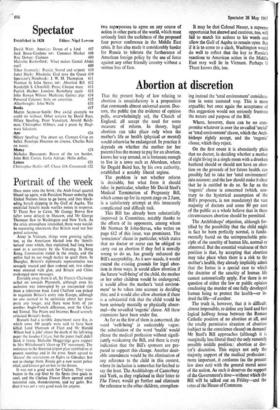Abortion at discretion
That the present body of law relating to abortion is unsatisfactory is a proposition that commands almost universal assent. Doc- tors, the public (on the evidence of opinion polls, overwhelmingly so), the Church of England, all accept the need for some measure of reform. In theory, legal abortion can take place only when the mother's life or health (physical or mental) would otherwise be endangered. In practice it depends on whether the mother (or her parents) has the money to pay for an abortion, knows her way around, or is fortunate enough to live in a town such as Aberdeen, where Sir Dugald Baird has, by his own authority, established a notably liberal regime.
The problem is not whether reform is desirable, but what form it should take: in particular, whether Mr David Steel's Medical Termination of Pregnancy Bill, which comes up for its report stage on 2 June, is a satisfactory attempt at this immensely complicated and difficult task.
This Bill has already been substantially improved in Committee, notably thanks to the efforts of its opponents, among whom Mr Norman St John-Stevas„ who writes on page 612 of this issue, was prominent. The 'conscience' clause in particular, which states that no doctor or nurse can be obliged to carry out an abortion if they feel it morally wrong to do so, has greatly enhanced the Bill's acceptability. As it now stands, it would extend the existing grounds for legal abor- tion in three ways. It would allow abortion if the future 'well-being' of the child, the mother or her other children would be endangered; it would allow the mother's 'total environ- ment' to be taken into account in deciding this; and it would also allow abortion if there is a substantial risk that the child would be born seriously mentally or physically abnor- mal—the so-called 'eugenic' clause. All these extensions have been under fire.
As far as the first of them is concerned, the word 'well-being' is undesirably vague; the substitution of the word 'health' would please the medical profession without signifi- cantly weakening the Bill, and there is every indication that the Bill's sponsors are pre- pared to support this change. Another desir- able amendment would be the elimination of any reference to the child in this context, where its inclusion is somewhat far-fetched to say the least. The Archbishops of Canterbury and York, as they explained in their letter to The Times, would go further and eliminate the reference to the other children, strengthen- ing instead the 'total environment' considera- tion in some unstated way. This is more arguable; but once again the acceptance of this suggestion would not seriously frustrate the nature and purpose of the Bill.
Where, however, there can be no com- promise whatever is over the so-called `social' or 'total environment' clause, which the Arch- bishops rightly accept, and the 'eugenic' clause, which they reject.
On the first count it is abundantly plain that no doctor, in deciding whether a mother of eight living in a single room with a drunken husband should or should not have an abor- tion on the grounds of her future health, can possibly fail to take her 'total environment' into account; and the law should make it clear that he is entitled to do so. So far as the `eugenic' clause is concerned" (which, con- trary to the hysterical assumption of the Bill's proposers, is not mandatory) the vast majority of doctors and some 80 per cent of the public as a whole believe that in these circumstances abortion should be permitted.
The Archbishops' objection, although for- tified by the possibility that the child might in fact be born perfectly normal, is funda- mentally based on the unimpeachable prin- ciple of the sanctity of human life, normal or abnormal. But the essential weakness of their position is that, by accepting that abortion may take place when there is a risk to the mother's health, they already implicitly admit that the foetus is a special case to which the doctrine of the sanctity of human life cannot automatically apply. For there is no question of either the law or public opinion condoning the murder of one fully developed human being to protect the health—or in- deed the life—of another.
The truth is, however, that it is dffficult, almost impossible, to define any hard and fast logical halfway house between the Roman Catholic .position of no abortion at all, and the totally permissive situation of abortion (subject to the conscience clause) on demand. Mr Steel's Bill approaches (although it is marginally less liberal than) the only remotely possible middle position: abortion at doc- tor's discretion. This enjoys not only the majority support of the medical profession : more important, it conforms (as the present law does not) with the general moral sense of the nation. As such it deserves the support of the Government's time—without which the will be talked out on Friday—and the votes of the House of Commons.


































 Previous page
Previous page